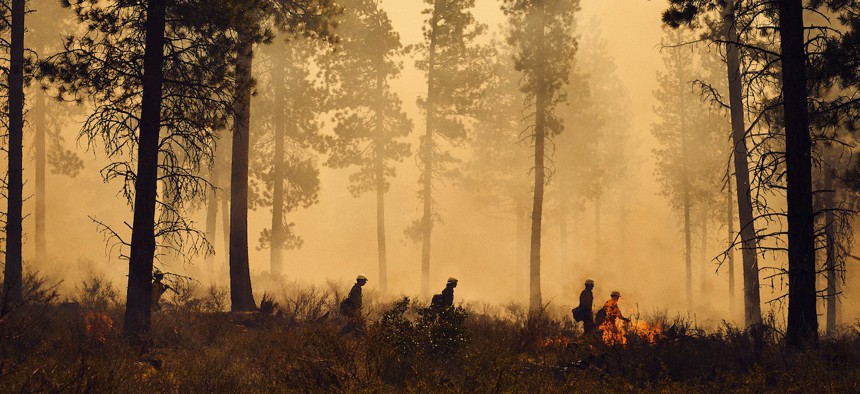
Federal firefighters in Oregon in 2014. Cole Barash via U.S. Forest Service/Flickr
Union warns at least one-third of federal wildland firefighters could walk if Congress walks off ‘pay cliff’
Officials with the National Federation of Federal Employees said Wednesday that competitors like Cal Fire and Pacific Gas and Electric are already looking to recruit federal firefighters fed up with their pay uncertainty.
As the federal workforce braces for yet another bout of shutdown politics this month, a union warns that unless Congress acts to avert a so-called “pay cliff” facing the corps of federal wildland firefighters, at least one-third of them will pursue jobs elsewhere.
In June 2022, the Biden administration authorized pay raises of $20,000 per year or 50% of their base salary, whichever was lower, for federal wildland firefighters, who until recently were often paid less than $15 per hour, as part of the implementation of the bipartisan infrastructure law. But the money from that law set aside to increase firefighter pay is set to run out at the end of September, meaning absent action from Congress, those firefighters are facing five-figure pay cuts next month, regardless of whether the government stays open.
There has been interest on Capitol Hill in ensuring that doesn’t happen, though the legislative crunch surrounding efforts to fund the government past September 30 could imperil those efforts. The Tim Hart Wildland Firefighter Classification and Pay Parity Act, introduced by Democrats last May, would set new special pay rates for federal wildland firefighters to ensure they make at least $20 per hour, establish a new form of overtime pay to compensate them for all hours they are mobilized to respond to a fire incident along with new forms of leave to improve their mental health and work-life balance.
And the Wildland Firefighter Paycheck Protection Act would make last year’s pay raises permanent for wildland firefighters as well as create a new pay supplement to pay them for days they’re mobilized.
Steve Lenkart, executive director of the National Federation of Federal Employees, which represents around 10,000 wildland firefighters, told Government Executive that there appears to be bipartisan support for enacting one of those bills in the Senate and House Speaker Kevin McCarthy, R-Calif., has indicated he would support extending firefighters’ recent pay raises as part of a short-term continuing resolution. But there are fears that Sen. Rand Paul, R-Ky., who voted against the Wildland Firefighter Paycheck Protection Act in committee, could block efforts to fast track the bill’s consideration on the Senate floor, while House conservatives’ ongoing mutiny against McCarthy could derail action in that chamber.
If no action is taken by the end of the month, Lenkart said the money to pay for the firefighters’ temporary raises will likely run out sometime in October. After that, he said he expects somewhere between one-third and one-half of the federal wildland firefighting corps to quit within the next year.
“You know, Cal Fire and [Pacific Gas and Electric], the California energy company, they are aggressively pursuing federal wildland firefighters, hiring them at double and sometimes triple the salary, so they’re just sitting and waiting for this to happen,” Lenkart said. “They’re the only people watching this bill more closely than we are, and they’re offering abbreviated training: ‘We’ll just get you acclimated and kick you out [into the field]. People are saying, ‘What the f--- am I doing with the U.S. Forest Service if they can’t even make sure that I won’t get a pay cut?’”
Lenkart noted that if federal firefighters’ pay is cut to pre-2022 levels next month, those salary offers from state and local organizations would rise to three- to four-times what they can make in the federal government.
“It should be noted that the WFPPA is not the answer to the full crisis,” he said. “All that bill does is prevent the pay cliff, the worst case scenario. We still need more money than what is in the WFPPA, and they need a lot of other overhauls on issues like mental health and work-life balance.”







